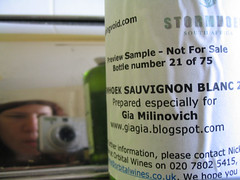Dumbed Down
As someone who has worked in television for almost 15 years, Jamie Goode’s post River Cottage Goes Lame, which is basically about how Channel 4’s ‘The River Cottage Treatment’ sucked, isn’t surprising in the least.
In the mid-90s, there seemed to be a massive influx of people to the British TV industry who seemed only really excited about meeting a ‘sleb’ rather than making good programmes. Ten years down the road and many of those people are now Commissioning Editors… the same people who decide what fills the schedules.
Producers of programmes aren’t necessarily experts in the subject they are producing – for example, producers of Science and Factual programmes are more often than not Arts graduates. The level of information on a topic tends to only go as deep as the producer’s. They probably went to film school assuming they were going to be the next Scorsese… and here they are producing a half-hour on friggin food. So, they bash that one out, cash their pay check and hope that Hollywood phones damned soon so they don’t have to accept that job on ‘Saturday Cooks!’ for Prospect Pictures.
Jamie Goode and his readers used words like “manipulative”, “facile”, “banal” and “utterly useless” in order to describe television. And I don’t disagree. With some exceptions, obviously, a huge number of people working in television are manipulative, facile, banal and utterly useless. And these are the people who are guiding on-screen talent like ‘The River Cottage Treatment’s’ Hugh Fearnley-Whittingstall.
I’ve had a producer ask me to try and make a guest cry. I’ve had a producer tell me ‘oh it’s just tv, lie’. I was once pitching a documentary idea to an executive producer about Albert Einstein’s first wife Mileva Maric, including her possible contributions to his Theories of Relativity, their illegitimate daughter who was given up for adoption and died young, how Mileva died penniless and is buried in an unmarked grave… this exec said, “This would be perfect for Jerry Hall to present!!”
Seriously.
When people go into an industry for the “wrong” reasons – ie the perceived glamour or the pursuit of fame over talent- rather than for a noble reason like “passion”, then you are going to get an industry that reflects that. If the industry continues to accept and encourage the “wrong” reasons (whilst at the same time keeping the doors barred to those who are passionate), there will be a tipping point where there is no turning back and it is stuck in its faded glory. That’s where television is right now- all of the passionate people are jumping ship. Face the facts, television is dead.
What’s the state of the wine industry?








